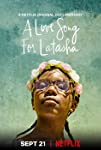Eye For Film >> Movies >> A Love Song For Latasha (2019) Film Review
A Love Song For Latasha
Reviewed by: Jennie Kermode

When we remember the dead - especially those whose deaths are surrounded by political turmoil - it's all too easy to lose sight of the people they were. Latasha Harlins was just 15 years old when she was shot to death in a convenience store in 1991, one of the incidents that sparked that year's Los Angeles uprisings. In this short documentary, her cousin and her best friend talk about who she was to them, her personality, her achievements and her ambitions, bringing into focus what it means for an individual to be cut out of the world.
"She didn't want to end up a statistic," says the friend, reflecting on the reasons why, even at this early stage in life, the straight-A student was working hard to make something of her life. Described as a neighbourhood big sister, she was always looking out for others, taking the vulnerable under her wing. She also knew how to have fun, with little social rituals and a favourite song. Memories inevitably fade with time, but the testimony given here feels fresh, seared into place by pain, by a determination to preserve something of who she was.
It's supported by a rich visual collage. Precious snippets of home movie are bound together with animation. Fluid and ever-changing, it evokes an immediate, fluid presence with none of the formality of death or history. There are snapshots of the café where she used to hang out, of the local swimming pool (now dry), of the beach. images, too, of the store where kids were routinely threatened with a cocked pistol but no action was taken because you get used to it. When the film reflects on the moment that news of Latasha's death broke, these images give way to abstraction, the kind of flickering, blistering purple one might see with eyes tight shut and knuckles pressed against them. Concrete images appear only in brief, disjointed form - a pair of hands touching, separating.
Years later, scars left by the loss of Latasha are still vivid, not because of what happened (and didn't happen) afterwards - which is referenced here only briefly, at the end - but because of who she was. It would be impossible to tell her whole story like this, but Sophia Nahli Allison's film is very effective at conveying the essence of a life and at making us understand, much more clearly, why it mattered.
Reviewed on: 20 Feb 2021















